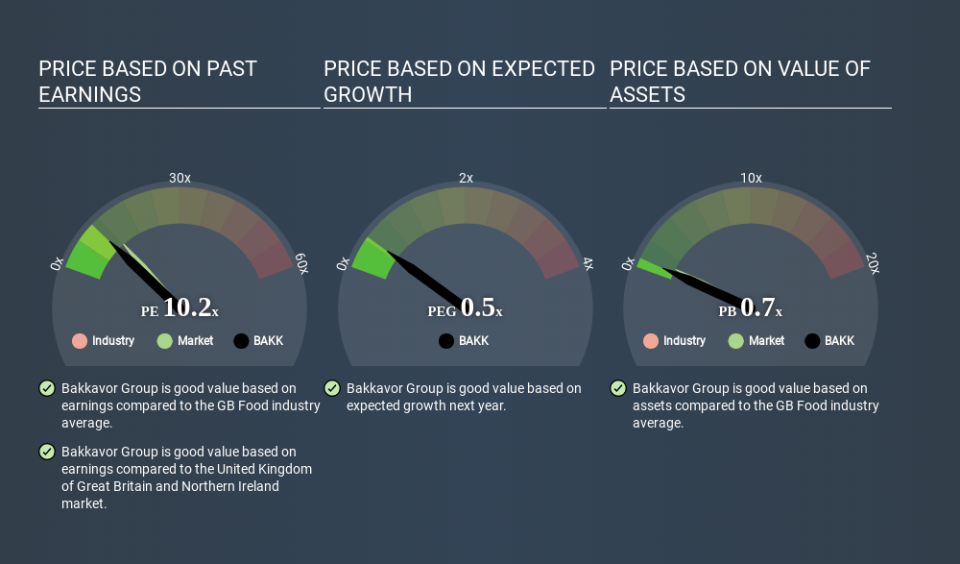What Is Bakkavor Group's (LON:BAKK) P/E Ratio After Its Share Price Tanked?

Unfortunately for some shareholders, the Bakkavor Group (LON:BAKK) share price has dived 37% in the last thirty days. That drop has capped off a tough year for shareholders, with the share price down 49% in that time.
Assuming nothing else has changed, a lower share price makes a stock more attractive to potential buyers. While the market sentiment towards a stock is very changeable, in the long run, the share price will tend to move in the same direction as earnings per share. The implication here is that long term investors have an opportunity when expectations of a company are too low. One way to gauge market expectations of a stock is to look at its Price to Earnings Ratio (PE Ratio). A high P/E ratio means that investors have a high expectation about future growth, while a low P/E ratio means they have low expectations about future growth.
View our latest analysis for Bakkavor Group
How Does Bakkavor Group's P/E Ratio Compare To Its Peers?
Bakkavor Group's P/E of 10.19 indicates relatively low sentiment towards the stock. If you look at the image below, you can see Bakkavor Group has a lower P/E than the average (12.4) in the food industry classification.
Bakkavor Group's P/E tells us that market participants think it will not fare as well as its peers in the same industry. Since the market seems unimpressed with Bakkavor Group, it's quite possible it could surprise on the upside. It is arguably worth checking if insiders are buying shares, because that might imply they believe the stock is undervalued.
How Growth Rates Impact P/E Ratios
Companies that shrink earnings per share quickly will rapidly decrease the 'E' in the equation. That means even if the current P/E is low, it will increase over time if the share price stays flat. A higher P/E should indicate the stock is expensive relative to others -- and that may encourage shareholders to sell.
Bakkavor Group's earnings per share fell by 45% in the last twelve months. And EPS is down 4.5% a year, over the last 5 years. This might lead to muted expectations.
A Limitation: P/E Ratios Ignore Debt and Cash In The Bank
The 'Price' in P/E reflects the market capitalization of the company. So it won't reflect the advantage of cash, or disadvantage of debt. Theoretically, a business can improve its earnings (and produce a lower P/E in the future) by investing in growth. That means taking on debt (or spending its cash).
Such expenditure might be good or bad, in the long term, but the point here is that the balance sheet is not reflected by this ratio.
How Does Bakkavor Group's Debt Impact Its P/E Ratio?
Net debt totals 93% of Bakkavor Group's market cap. This is a reasonably significant level of debt -- all else being equal you'd expect a much lower P/E than if it had net cash.
The Verdict On Bakkavor Group's P/E Ratio
Bakkavor Group trades on a P/E ratio of 10.2, which is below the GB market average of 12.3. Given meaningful debt, and a lack of recent growth, the market looks to be extrapolating this recent performance; reflecting low expectations for the future. What can be absolutely certain is that the market has become significantly less optimistic about Bakkavor Group over the last month, with the P/E ratio falling from 16.2 back then to 10.2 today. For those who don't like to trade against momentum, that could be a warning sign, but a contrarian investor might want to take a closer look.
Investors have an opportunity when market expectations about a stock are wrong. If the reality for a company is not as bad as the P/E ratio indicates, then the share price should increase as the market realizes this. So this free visual report on analyst forecasts could hold the key to an excellent investment decision.
But note: Bakkavor Group may not be the best stock to buy. So take a peek at this free list of interesting companies with strong recent earnings growth (and a P/E ratio below 20).
If you spot an error that warrants correction, please contact the editor at editorial-team@simplywallst.com. This article by Simply Wall St is general in nature. It does not constitute a recommendation to buy or sell any stock, and does not take account of your objectives, or your financial situation. Simply Wall St has no position in the stocks mentioned.
We aim to bring you long-term focused research analysis driven by fundamental data. Note that our analysis may not factor in the latest price-sensitive company announcements or qualitative material. Thank you for reading.


